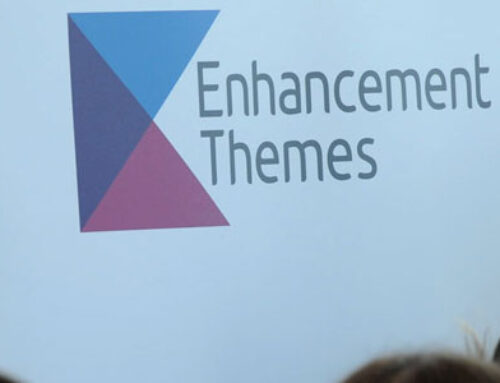In this blog, Dr Robin Westacott, Associate Professor and Director of Apprenticeships, presents a QAA Enhancement Themes Project led by him and Dr Anne Tierney aimed at understanding the potential and barriers to using microcredentials in Scotland.
Imagine a future where an individual’s need to upgrade workplace skills or learn new skills is much more frequent than it has ever been; where the changing economy means that some sectors suffer significant contraction, while new technology opens or rapidly expands other sectors, and employers need rapid training of their staff. Employers want and will continue to want their workforce to have knowledge and skills that are accredited and regulated.
That future isn’t very far away, and the existing reality of people already in the workplace who need higher level qualifications in order to advance their career is a longstanding problem. Microcredentials and digital badges, which can be used at both undergraduate and postgraduate levels, can provide recognisable and transferable certification that can be accumulated towards a larger award.
Why should Heriot-Watt care about Microcredentials and Digital Badges?
For Heriot-Watt, microcredentials are a way to further engage with employers, alumni and other independent learners. The engagement with employers also provides the opportunity for broader interaction with these organisations in terms of research and innovation.
The Scottish Funding Council is also directing part of its funding to HEIs for the delivery of single courses that bear credit for people in work. The current minimum course size at Heriot-Watt (15 credits or 150 hours of learning) would count as a microcredential and, on successful completion, could be used later as part of a larger award (e.g., a course that is part of a Masters programme could be offered standalone and a learner who successfully completed this course would then be exempt from it if they enrolled on the full Masters programme). For employed people, registering on a full-time programme is restrictive, as they would be tied to acquiring credit on top of their full-time employment or giving up work (and salary) to do it.
So, microcredentials would allow HEIs to offer a wider, more flexible CPD offering of smaller units for people whose situation is not conducive to committing to an extended programme of study. Micro-credentials offer the flexibility of standing on their own as an accredited recognition of skills and education, but also as a starting place for larger programmes of study, should an individual’s circumstances change.
COVID-19 has altered the way organisations work, as many businesses have switched to online, remote models of working and have adapted how their products and services are offered. This digital, online transformation also requires universities to adjust to ensure individuals are prepared with the desired skillset for the changing workplace. The use of microcredentials/digital credentialing is one approach to help address this skills gap.
What is the project doing?
The collaborative cluster now involves 11 of the HEIs in Scotland, plus input from JISC as a provider of digital badges, and is seeking to understand the potential benefits that microcredentials could afford to students, academics, employers and employees/alumni, but this needs to be preceded by making sure that these stakeholders have a good understanding of what these and digital badges are. We have four inter-institutional teams, each investigating one of the stakeholder groups, including organising stakeholder events and questionnaires to improve our understanding of existing perceptions.
We also recognise that a lot of work in this area has already been done, for example by the Open University in the UK. However, international microcredentials and digital badges are much more widely used (see Deakin University), and we are gathering and reviewing examples of international practice.
Looking forward
We think that for microcredentials to become more prevalent in Scotland, we need a national approach to negotiating some of the barriers and misconceptions. One of the many perceived benefits of microcredentials should come from their potential stackability, i.e. their combination to achieve a greater award (for example, a Graduate Certificate), yet this only really works if all the credentials are obtained from the same provider unless there is a nationally agreed framework including agreed quality standards. Additionally, the difficult question of who would award the umbrella qualification if a learner has microcredentials from more than one provider needs to be addressed.
As digital transformation and automation changes the nature of work, the development and recording of meta-skills will become more and more important for employers and therefore their employees, especially where these can be evidenced based on workplace or other experiences, and these too could be recorded as a credential or digital badge.
We are also investigating the challenges to wider use of microcredentials in Scotland; these include:
- The lack of a national framework to regulate and support clear understanding of the use and value of microcredentials.
- The meta-data supporting a badge contains sufficient information to define the skills, knowledge and competencies that warrant award of the badge and the quality control that maintains standards.
For more info on the project, visit the ‘Exploring the Potential of Microcredentials and Digital Badging’ Collaborative Cluster page.
Image credit: Scott Graham on Unsplash.





